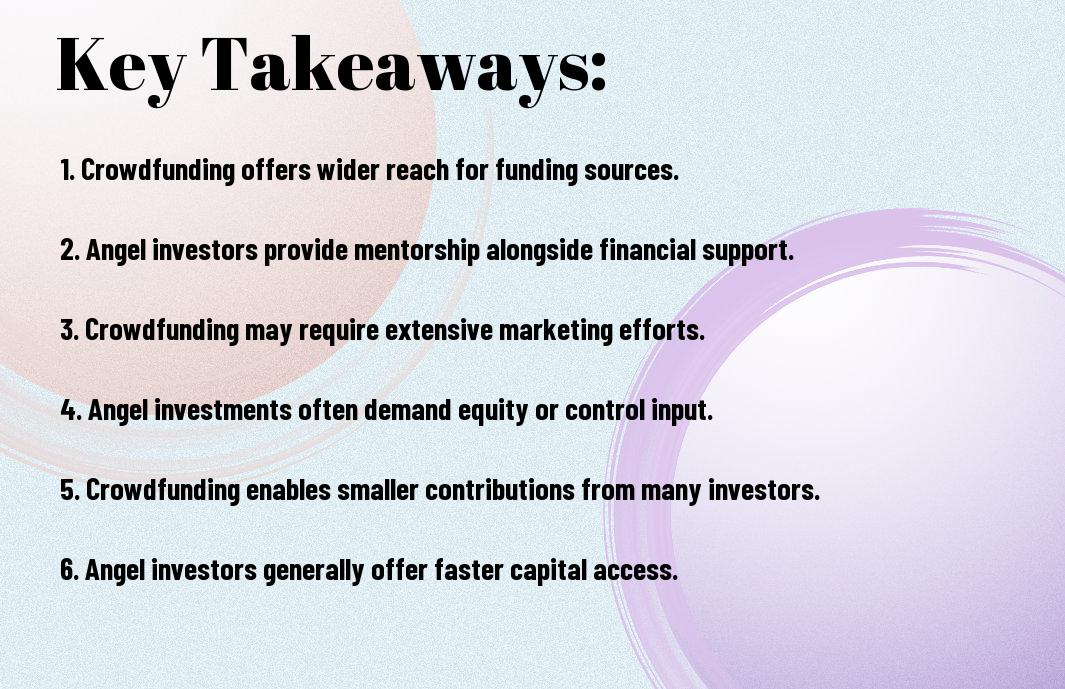With the rise of new financing options for startups, understanding the differences between crowdfunding and angel investing is crucial for your entrepreneurial journey. Each approach comes with its own set of advantages and challenges that can significantly impact your business growth. In this blog post, you will discover how these two funding methods compare, helping you make an informed choice that aligns with your financial goals and vision for your startup.
Key Takeaways:
- Funding Access: Crowdfunding allows entrepreneurs to access a larger pool of small investors, while angel investing typically involves securing funds from a select group of wealthy individuals.
- Equity vs. Rewards: In angel investing, founders often give up equity in exchange for capital, whereas crowdfunding can offer non-equity rewards such as products or experiences to backers.
- Control and Oversight: Angel investors may want a say in business decisions and offer mentorship, while crowdfunding generally allows founders to maintain full control over their venture without investor oversight.

Understanding Crowdfunding
Before venturing into the details, it’s crucial to grasp what crowdfunding entails. This financing model allows individuals or businesses to raise funds from a large number of people, typically via online platforms. For a deeper insight into crowdfunding compared to angel investing, check out Angel Investing vs. Crowdfunding: How to Raise Money for Your Startup.
Definition and Mechanisms
To understand crowdfunding, it is important to know that it typically involves pitching your idea or project to the public via a platform. Contributors make small investments in exchange for rewards, equity, or just to support the venture. Platforms streamline this process, allowing you to reach potential backers easily.
Types of Crowdfunding
With various types of crowdfunding available, you can choose a method that aligns with your project needs. Each type offers unique benefits and caters to different audience segments:
| Type of Crowdfunding | Description |
|---|---|
| Reward-Based | Backers receive rewards like products or experiences. |
| Equity-Based | Investors receive equity in the business. |
| Debt-Based | Investors lend money with expectations of repayment. |
| Donation-Based | Contributions are given without expectations of returns. |
| Real Estate Crowdfunding | Investors pool funds to invest in real estate projects. |
After assessing different crowdfunding types, you’ll find that each serves distinct purposes, allowing you to tailor your approach based on your project goals or audience interests.
But understanding how these types function can give you a strategic advantage in funding your venture effectively. Here are some additional insights:
| Type | Potential Benefits |
|---|---|
| Reward-Based | Ideal for creative projects, fosters community support. |
| Equity-Based | Access to large sums, investors may provide expertise. |
| Debt-Based | Allows funding without giving up ownership. |
| Donation-Based | Good for social causes, builds awareness. |
| Real Estate Crowdfunding | Diversifies investment opportunities for real estate. |
After evaluating these options, you can better decide which crowdfunding model will be most effective for your needs, leading to a more effective fundraising experience.
Exploring Angel Investing
Some entrepreneurs consider angel investing as a viable funding option to help them bring their innovative ideas to life. This form of investment typically involves high-net-worth individuals, known as angel investors, who provide capital in exchange for equity or convertible debt in your startup, supporting your journey in early-stage growth.
Definition and Characteristics
By focusing on smaller amounts of funding often provided in the range of tens of thousands to a few million dollars, angel investing helps startups gain access to vital capital during crucial growth phases. Unlike traditional venture capital, angel investors usually offer more flexible terms and may also provide mentorship, insights, and connections within their networks, benefiting both parties involved.
Typical Investor Profiles
After gaining an understanding of angel investing, it’s important to consider the typical profiles of investors who engage in this space. Generally, angel investors possess a strong financial background and are often entrepreneurs themselves, seeking to support the next generation of innovators while achieving potential high returns on their investments.
Consequently, you may find that many angel investors have extensive experience in the industries they support. They often seek to invest in businesses that resonate with their personal interests or professional backgrounds. This alignment allows them to provide not only capital but also valuable guidance based on their firsthand experiences. When approaching angel investors, comprehending their typical profiles can help you tailor your pitch to highlight how your startup aligns with their investment philosophy and experience.
Advantages of Crowdfunding
Despite the traditional challenges of fundraising, crowdfunding offers numerous advantages that can significantly benefit you as an entrepreneur. This funding method allows for the quick collection of small amounts of money from a large number of people, enabling you to secure capital without needing extensive networking or backing from wealthy investors. Additionally, you can validate your business idea, gain valuable feedback from potential customers, and build a loyal base of supporters even before launching your product or service.
Accessibility for Entrepreneurs
After assessing various funding options, you may find that crowdfunding is particularly accessible. Unlike angel investing, which often requires you to meet strict financial criteria and present a polished pitch, crowdfunding platforms allow you to present your idea directly to a wider audience. This means that even if you’re just starting or don’t have an extensive network, you can still secure the resources needed to bring your vision to life.
Community Engagement and Marketing
With the interactive nature of crowdfunding, you have a unique opportunity to engage with your community and create excitement around your project. By leveraging social media and engaging directly with backers, you can turn your supporters into your most effective marketing tool. This engagement fosters a sense of ownership among your backers, encouraging them to share your project and help spread the word.
It’s not just about raising funds; crowdfunding allows you to cultivate a loyal community that is invested in your success. By sharing updates, addressing concerns, and thanking your backers, you can build a relationship that goes beyond a mere transaction. This ongoing interaction not only generates buzz around your project but also helps create a network of advocates who are more likely to support you in future endeavors.
Advantages of Angel Investing
All angel investing offers unique advantages that can significantly enhance your startup journey. With direct investments from individuals who have substantial resources, you gain access to larger funding amounts compared to crowdfunding. You also benefit from the expertise and industry insights of seasoned investors who can guide you in making informed business decisions, paving the way for potential success.
Financial Support and Mentorship
By securing an angel investor, you not only receive financial backing but also invaluable mentorship that can steer your business in the right direction. These investors often have extensive experience and knowledge in your industry, allowing them to provide guidance on strategy, market trends, and operational issues that may arise during your startup phase.
Network Opportunities
Around angel investors, you can tap into an extensive network of contacts that can benefit your business. These investors often come with connections to other entrepreneurs, potential customers, suppliers, and even future funders, giving you a wider reach and increased visibility in your market.
Hence, leveraging the network opportunities that come with angel investment can be a game changer for your startup. Accessing introductions to key players in your industry allows you to form partnerships that can lead to new customers or collaborations. Additionally, being part of an investor’s network can open doors to events, pitch opportunities, and forums that are otherwise difficult to navigate. This support extends beyond just financial assistance, as it provides you with the visibility and credibility necessary for growth.

Disadvantages of Crowdfunding
Keep in mind that crowdfunding, while enticing, has its drawbacks. One significant concern is the time and effort required to create an appealing campaign. You will need to develop compelling marketing materials and engage with backers consistently to maintain interest. If unsuccessful, you may end up spending more resources than anticipated without receiving the funding needed for your project.
Market Saturation and Competition
Between countless crowdfunding platforms and numerous projects vying for attention, market saturation can pose a significant challenge to your campaign. It can be difficult to stand out amidst a sea of similar initiatives, meaning you may struggle to capture the audience’s interest and secure the funding you need.
Potential for Unmet Expectations
Unmet expectations can be a major downside of crowdfunding. When you seek funds, you may put forth an ideal vision of your project that raises your backers’ hopes, but the reality of delivering on that vision can be daunting.
Due to the inherent uncertainties of starting a new venture, unexpected hurdles or delays may arise, leading to a situation where backers do not receive the rewards they anticipated or the timeline for project completion extends beyond expectations. This disconnection can erode trust, damage your reputation, and diminish future fundraising prospects, making clear communication and setting realistic goals imperative when crowdfunding.
Disadvantages of Angel Investing
Once again, it’s important to recognize that angel investing has its downsides. One significant drawback is the often high expectations associated with the investment. As an entrepreneur, you might find yourself under pressure to deliver quick returns, which can compromise your vision and growth strategy. For a deeper comparison on the topic, check out this Crowdfunding vs Angel Investing analysis.
Limited Funding Availability
With angel investing, you may encounter limited funding options since it relies heavily on individual investors. This can restrict the amount of capital you can raise, especially if you are seeking significant financial backing. Often, one or a few angels can only offer funding, which may not be sufficient for all your business needs.
Equity Dilution and Control Issues
Across the angel investing spectrum, it’s imperative to consider the potential for equity dilution and the control lost in your business. When you bring on angel investors, you’re often sharing ownership, which can affect your decision-making power and long-term vision.
Another aspect to bear in mind is the balance between the money you receive and the percentage of your company you’re required to give up. As you add more investors, you may find yourself in a position where their influence and decision-making capabilities can overshadow your original intent for the business. This equity dilution can turn a vision into a struggle for control, ultimately influencing your strategy and growth trajectory.
Conclusion
From above, it’s clear that both crowdfunding and angel investing offer unique advantages and drawbacks that can significantly impact your business journey. Crowdfunding provides access to a wider audience and helps build a community around your project, while angel investing offers substantial financial backing along with valuable mentorship. Evaluating your specific needs, goals, and the stage of your venture will guide you in choosing the best path. Ultimately, understanding these options allows you to make an informed decision that aligns with your entrepreneurial vision.
FAQ
Q: What are the main advantages of crowdfunding compared to angel investing?
A: Crowdfunding offers several benefits, such as access to a larger pool of potential investors, which can result in securing more funds from a wider audience. Additionally, it allows entrepreneurs to validate their ideas and gain market feedback before launching their products. Crowdfunding platforms often provide marketing exposure to the project, helping to build a customer base and brand awareness early on. This method is usually more democratized, enabling anyone to invest, not just high-net-worth individuals, which can create a supportive community around the product or service being offered.
Q: What are the disadvantages of crowdfunding when compared to angel investing?
A: One downside to crowdfunding is the significant effort and resources required to create a compelling campaign, which includes marketing materials, video production, and regular updates to backers. There is also no guarantee of raising sufficient funds, as campaigns can fail even with extensive preparation. Furthermore, crowdfunding often entails giving up a portion of ownership or rewards, which can dilute equity for founders. Legal complexities and regulatory compliance can also pose challenges, and the potential for public failure can impact the startup’s reputation.
Q: How does angel investing provide unique benefits compared to crowdfunding?
A: Angel investing offers unique advantages, notably the expertise and mentorship that angel investors often provide. These investors are typically experienced entrepreneurs or high-net-worth individuals who can offer strategic guidance, industry connections, and support in navigating the complexities of starting and scaling a business. Additionally, angel investors usually invest larger sums of money than individual crowdfunding backers, which can offer startups the financial backing needed to accelerate growth significantly. Investment from angels can also lend more credibility and validation to the business in the eyes of future investors and lenders, which may facilitate future funding rounds.


